The Electronic Intifada 17 January 2025
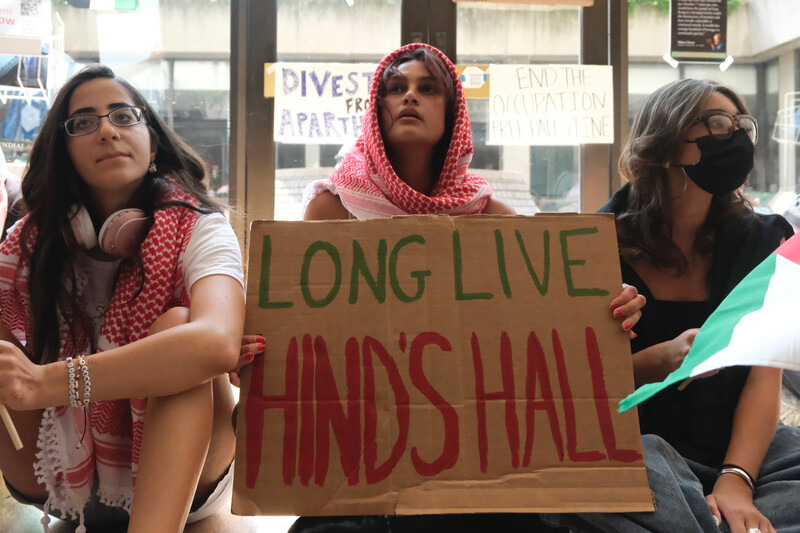
Pro-Palestine students protest against Hillary Clinton, who teaches at the School of International and Public Affairs at Columbia University, on 4 September 2024
I got my acceptance letter to study at Columbia University a month before its suppression of pro-Palestine activism accidentally gave birth to a global student uprising.
Between 17 and 30 April, more than a hundred students pitched their tents on the South Lawn of Columbia University’s New York City campus, establishing the first “Gaza solidarity encampment.”
Students demanded that the university divest from companies selling weapons to Israel and sever all academic ties with Israeli universities. Among other demands, protesters wanted Columbia to be transparent about its investments and to publicly call for a permanent ceasefire in Gaza.
The encampment felt to me like a glimmer of hope after I had spent six months doom scrolling the slaughter of my people from the safety of my home.
By April 2024, the reported death toll in Gaza had surpassed 34,000 – an incomplete tally given that it did not account for those killed in Israeli attacks but whose bodies could not be recovered from the rubble. Nor did it account for those killed by starvation, or those who died because they were unable to access medical care due to Israel’s siege.
By then, I had been trapped for six months in a perpetual state of mourning for people I had never met, feeling ashamed by the knowledge that there was nothing I could do to help them. The weight of their deaths was so heavy that I grew numb just to get through the days without breaking down.
Meanwhile, the students at Columbia were mobilized and fearless. They were willing to risk an Ivy League degree and even the careers that might have been opened to them by an elitist education to stand against the administration’s complicity in genocide.
When I arrived on campus for orientation in August 2024, the first thing I did was walk up to a security guard. “Excuse me, could you tell which of these lawns was the one where students set up the encampment?” I asked.
I found the spot, sat on the grass, staring in awe at Hamilton Hall.
On 30 April, two weeks after the first encampment went up, 46 protesters had occupied the academic building. The same Hamilton Hall was famously taken over by students in 1968 during the protests against the Vietnam War.
During the 2024 takeover, banners hung from the building’s windows, renaming it Hind’s Hall in memory of Hind Rajab, a 6-year-old Palestinian girl killed in January 2024 by Israeli forces while her family fled their home in Gaza City.
Little Hind spent hours stranded in a car, pleading for help among the bodies of her family members, before troops in an Israeli tank killed her and two paramedics who attempted to come to her rescue in coordination with the military. The vehicle in which Hind and her family were killed was hit by some 335 rounds of bullets, as per Forensic Architecture
The protestors were arrested the same day as the declaration of Hind’s Hall and charged with trespassing. The students among them were placed on interim suspension – immediately barring them from attending classes and university activities – pending reviews.
Students suspended
On 20 June, Manhattan District Attorney Alvin Bragg dropped charges against 31 of the protestors, citing insufficient evidence. Yet by the end of my first week at Columbia, I learned that the students who participated remained suspended, with some facing bans of up to two years.
The remaining students were exhausted from enduring a series of disciplinary hearings, arrests, campus surveillance and trucks circling campus doxing student activists and branding them as anti-Semitic. The outcome, if not the intent, was to wear down students advocating for Palestinian rights while intimidating others from joining the movement.
These burdens have been especially heavy for Palestinian students, who are grappling with survivor’s guilt over escaping a genocide, while also dealing with an institution that was suppressing their every effort to advocate for their people’s liberation.
“Burnout fills me with guilt,” said a student I’ll call Farah, who spoke to me on the condition of anonymity due to fears of being doxed.
“I think about being a Palestinian who has the privilege of organizing at Columbia University, and feel so guilty about the fact that I’m exhausted when I’m not even going through what the people in Gaza or my family in Tulkarm are experiencing,” she said, referring to a city in the occupied West Bank.
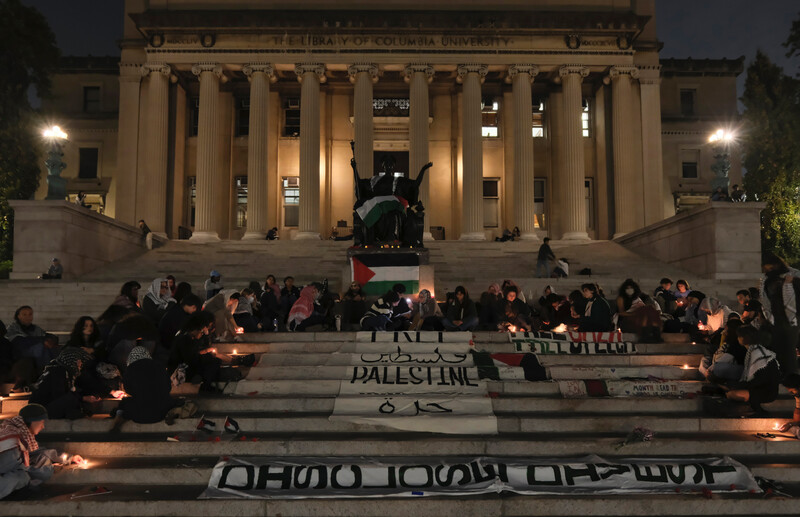
Students participate in a vigil to mourn Palestinians killed in Israel’s genocidal war in Gaza at the steps of Columbia University’s Low Library, 2 October 2024.
I first met Farah in early September when I began photographing actions by Columbia University Apartheid Divestment, a coalition of student groups that formed after the administration suspended Students for Justice in Palestine and Jewish Voice for Peace in November 2023. I was amazed by how she juggled training new students, participating in weekly actions and providing jail support for classmates arrested at protests across New York City.
But when your tuition fees are funding the weapons massacring your people through Columbia’s investments, there is little that can ease the guilt that gnaws at you when your head hits the pillow at night, and Farah could no more escape this fact than could I.
“Sometimes it feels like if I’m not taking the highest risk, like getting arrested or doing something that will, for sure, lead to disciplinary action, then I’m not doing everything that I can,” Farah said.
During the encampment, which made global headlines, Farah and a few other students received media training so they could handle interview after interview. Farah, then 19, recalled that nearly every network asked her to clarify whether the encampment was affiliated with Hamas, linked to violence, or if it was making Jewish people fearful.
She described the experience as profoundly dehumanizing.
As Farah pushed through those days and nights with little food or sleep, she found herself operating on autopilot. She said that when the police dismantled the encampment on 30 April, the emotional toll left her bedridden for two weeks as she struggled to catch up on her final exams.
“Thankfully, a lot of my professors were understanding,” Farah explained. “What was crazy is that I’ve been dealing with watching my people’s genocide for a year, but the violence on our campus is what makes [my professor] think that I might need an extension?”
“Watched and targeted”
While Columbia University Apartheid Divestment has grown to more than 200 members, the bulk of responsibility this semester has fallen on the shoulders of a smaller group of organizers who have remained actively involved. Sustaining the momentum was a challenge in itself.
Since August, Columbia students have organized several campus actions, but these barely matched the numbers seen in April. While the first few protests made headlines, media interest faded as their expectation of another large-scale disruption like the encampment waned.
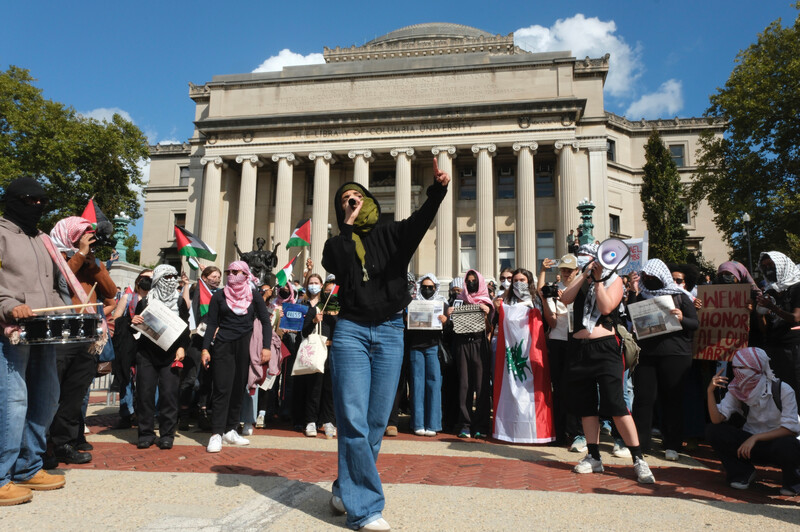
Students stage a walkout to mark the one-year anniversary of Israel’s genocidal war on Gaza at Columbia University on 7 October 2024.
Cultural anthropologists might describe this as the fluctuating nature of popular movements. But by 7 October 2024, I had spent more than a year witnessing Israel bomb hospitals, massacre refugees and starve millions of civilians.
In the face of such atrocities, no social theory could explain – or justify – why people around me were seemingly no longer interested in fighting against genocide.
Yet on 7 October last year, protests on campus were the largest I had seen all semester. Both the pro-Israel rally and the much larger pro-Palestine protest were held near Low Library, separated by heavy barricades and campus security.
When Columbia University Apartheid Divestment announced its plans for an unsanctioned walkout that day, it published safety tips to help participants avoid reprimands from the administration: wear dark, nondescript clothing; cover your face with a mask; avoid swiping your university ID at the entrance; and avoid using Columbia Wi-Fi.
An investigation published by Columbia Daily Spectator a month earlier revealed that the university used CCTV footage and ID swipe records to track students’ activities during protests. Surveillance had grown so intrusive that on 1 April, private investigators who said they were hired by the university showed up at the home of Fadi Shuman, a Palestinian graduate student, to investigate his involvement in an unsanctioned teach-in on campus.
Fadi said to me that he felt Columbia had profiled him based solely on CCTV footage of him standing outside the building where the event was held. He told me that months later Columbia allowed police to enter his university residential apartment without a warrant.
“Living here with my wife feels unsafe, like we’re being watched and targeted,” he said.
Guilt
Journalism students covering the 7 October anniversary protests, including myself, were assured by our professors that we would be shielded from disciplinary actions by the administration. One professor advised me not to wear a kuffiyeh [checkered scarf], to clarify my role as a reporter and to display my impartiality in line with what he characterized as principles of ethical journalism.
But being Palestinian means that my identity itself is political – something I cannot simply remove, unlike a kuffiyeh. Reporting on the protests rather than participating in them, knowing I was protected from disciplinary sanctions, left me feeling deeply torn.
Many told me I didn’t need to protest because my journalism was a valuable form of advocacy in its own right. But by conforming to this style of “neutral” reporting, I felt complicit in upholding conventions that enable Western outlets to mask their pro-Israel bias under the guise of impartiality.
In reality, “both sides” journalism manufactures consent for occupation by equating the oppressed with their oppressors.
More so, I couldn’t shake the guilt of choosing the path that offered me protection – it felt like a cop-out. Like Farah, I felt that if I wasn’t putting my body on the line, I wasn’t doing enough.
I wondered if my interest in campus organizing was less about genuine commitment to winning our demand for divestment and more about trying to ease my guilty conscience for not sharing in the suffering of those in Gaza. The line between the activist I wanted to be and what I feared was a self-serving need to self-sacrifice seemed blurry.
The weeks following the 7 October protests were somber. Every night, students were gathering by the Low Library steps for a vigil, reciting the names of Palestinian martyrs in Gaza – a number that by then had soared to more than 41,000.
I watched several onlookers walk past the vigil mocking it, laughing as they took pictures.
Layla Saliba, a Palestinian graduate student, said she felt that the administration’s failure to protect them from harassment by pro-Israel students and professors had only emboldened such behavior to continue.
On 19 January last year, an Israeli student attacked her with a foul-smelling substance while she was protesting the immense loss of life in Gaza, including 14 of her family members killed in a church bombing. Layla showed me her medical records from 20 January stating that she was admitted to urgent care after experiencing fatigue, headaches and nausea.
Several other students reported being hospitalized for similar symptoms.
“The only reason the attacker was identified and later suspended was because of student efforts. I took photos and videos and I basically had to conduct a mini-investigation because Columbia tried to ignore it as much as possible,” Layla said.
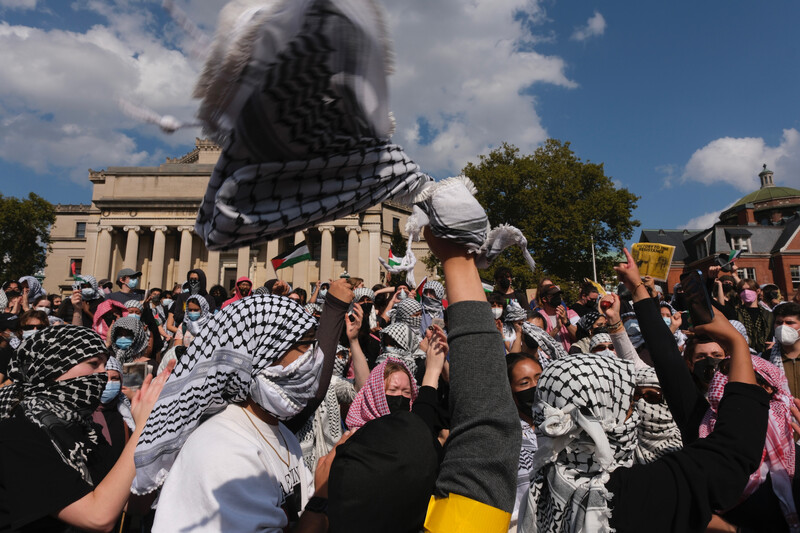
Students stage a walkout to mark the one-year anniversary of Israel’s genocidal war on Gaza at Columbia University on 7 October 2024.
In April 2024, one of the two Israeli students involved in the incident filed a lawsuit against Columbia, claiming that the university had excessively disciplined him for the incident. A report released by the Committee on Education and the Workforce in the US House of Representatives on 30 October revealed that the university had reached a $395,000 settlement with the Israeli student.
His suspension was also lowered to a disciplinary probation as per the House report.
“The settlement was devastating, especially since Columbia never offered to cover my medical bills or compensate me for all the clothes I had to throw away because they reeked so badly,” Layla said.
Going public about her experience made her easily recognizable on campus and subjected her to online harassment. Doxing websites like Canary Mission and Iron Sword labeled her a “terrorist sympathizer.”
“Being the face of a movement feels weird. This movement isn’t about me; it’s about the people in Gaza. I’ve felt so uncomfortable taking up space that should be centered on them,” she said.
Doxing and harassment
Doxing on campus began in October 2023 when a driver of a truck circled around Columbia for hours, day after day, displaying a digital billboard with the words “Columbia’s Leading Antisemites,” alongside the names and faces of Arab, Muslim and Palestinian students allegedly affiliated with organizations that had signed a Palestinian solidarity statement.
As an outspoken Palestinian on campus, I’ve come to terms with the inevitability of facing my share of harassment too.
Many organizers conceal their identities with masks and kuffiyehs. However, one Palestinian graduate student, who I’ll call Omar, has refused to cave into the intimidation and says he has never worn a mask while protesting on campus.
Still, he recognizes that not concealing his identity on campus has left him vulnerable to the administration and says it has used scare tactics against him.
In November last year, Omar received notice of a disciplinary investigation for his alleged involvement in campus actions. The university informed him that, despite his upcoming graduation in December, they would withhold his transcript until the conclusion of proceedings.
Omar has become an easily recognizable figure on campus since October 2023 and, like Layla, was doxed by Canary Mission. However, as the disciplinary probe is ongoing, Omar agreed to speak on the condition of anonymity.
“Whenever an action happens on campus – whether I have anything to do with it or not – the university always targets me first. They assume I’m behind it or that I know something about it just because I’m an active Palestinian student on campus,” he said.
Although Omar is eager to receive his diploma, he spoke about how witnessing the atrocities back home while advocating for divestment has deeply impacted his learning.
“My education experience at Columbia has been really bad, because I couldn’t focus on anything,” he said. “I’ve been doing the assignments for the sake of doing them, not for the sake of learning, just so that I could pass my program and that’s it.”
By December, I too felt unable to focus on classes, with assignments taking a backseat to organizing. But with both the student movement and my academic journey now feeling stagnant, while the death toll in Gaza passed 45,000, I began questioning whether coming to Columbia was worth it – whether I could justify paying tuition fees that, in part, were funding genocide.
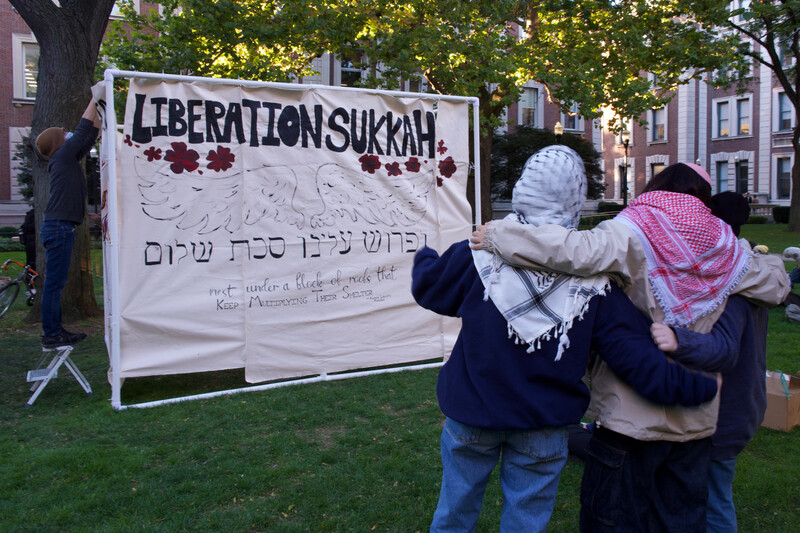
Students organizing with Jewish Voice for Peace build a Liberation Sukkah at Columbia University’s Math Lawn, 16 October 2024.
The student movement gave me, for the first time, the intellectual space to confront feelings I had long suppressed – about Gaza, my complicity as a Palestinian living in the West, and how I envisioned my role within the fight for liberation. It had opened a can of worms, bringing buried emotions and difficult questions to the surface.
For Palestinians in the diaspora, the pain we carry is overwhelming, often affecting our ability to function in daily life.
Yet, I would never wish to take that pain away. It’s a reminder that I still care, that I still hold onto my humanity.
When I witness injustice, that pain drives me to act.
While organizing at Columbia has felt stagnant in recent months, it hasn’t stopped – even as the second semester soon begins under the shadow of Donald Trump’s looming inauguration. His term is set to feature a renewed crackdown on student protests through a strategy set out by the Heritage Foundation called Project Esther and ostensibly aimed at combatting “the scourge of anti-Semitism in the United States.”
An analysis by the Israeli newspaper Haaretz suggests that the administration’s harshest measures could include deporting pro-Palestinian protesters in the US on student visas.
Despite threats of an escalated crackdown, and as news of the ceasefire agreement between Hamas and Israel broke on Wednesday, it was business as usual for student organizers at Columbia. They are still planning to advance the fight for divestment to ensure that the horrors of the past 15 months are never repeated.
I came to Columbia expecting to meet students who were extraordinarily talented and brilliant – people capable of starting a global movement. But I quickly realized that wasn’t the point.
If I did learn anything this fall semester, it was that you don’t have to be exceptional to achieve something exceptional; you just have to care enough.
Tamara Turki is a Palestinian Austrian journalist based in New York City, studying at Columbia Journalism School with a law degree from King’s College London.


